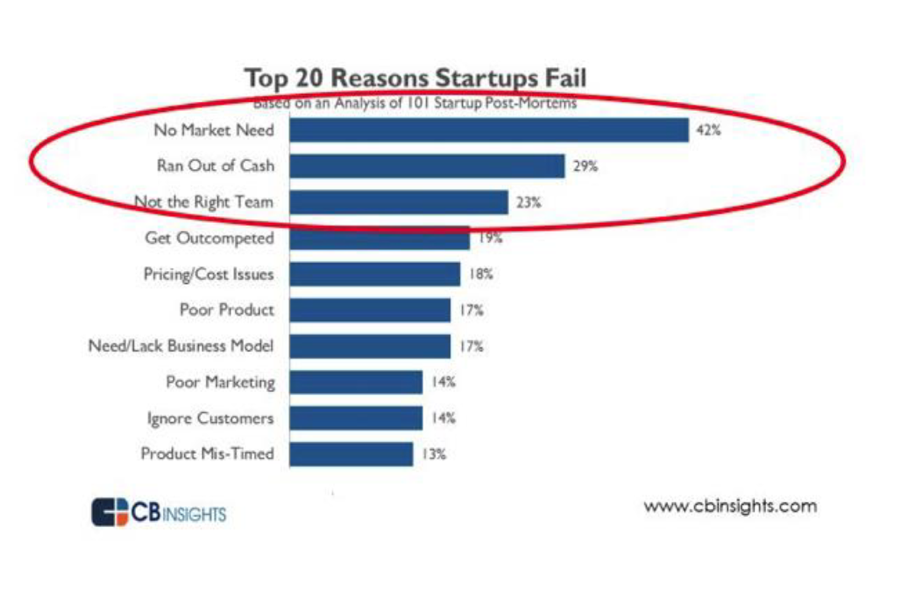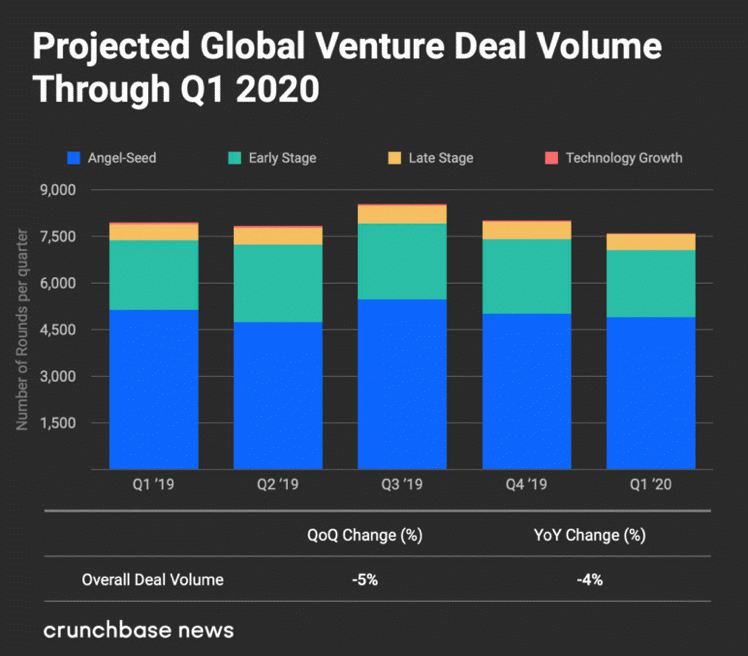Why Raising a Growth Round Is Getting Much Harder
 Most
companies that raise their seed and Series A rounds fail, primarily
due to a few reasons:
Most
companies that raise their seed and Series A rounds fail, primarily
due to a few reasons:
 Lack of product-market fit and team issues are common. The most common
reason, however, is the lack of access to capital, especially growth
capital. The result is that less than 25% of funded startups go on to
raise a Growth round, according
to Crunchbase News. Given the
increase
in
seed-stage
deal
sizes,
companies are
more
developed
and
demonstrate
more
traction
when
they
raise
their
Series
A.
Given this
environment,
two converging trends are
making
it
more
difficult
to
raise growth (B)
round. This leaves many startups
in a difficult position, as they will need additional time and
funding
to
bridge
the
gap
needed
to
scale
to
the
higher
levels
now
required
for
a
growth round resulting in higher
pre-money valuations. This is due to many reasons:
Lack of product-market fit and team issues are common. The most common
reason, however, is the lack of access to capital, especially growth
capital. The result is that less than 25% of funded startups go on to
raise a Growth round, according
to Crunchbase News. Given the
increase
in
seed-stage
deal
sizes,
companies are
more
developed
and
demonstrate
more
traction
when
they
raise
their
Series
A.
Given this
environment,
two converging trends are
making
it
more
difficult
to
raise growth (B)
round. This leaves many startups
in a difficult position, as they will need additional time and
funding
to
bridge
the
gap
needed
to
scale
to
the
higher
levels
now
required
for
a
growth round resulting in higher
pre-money valuations. This is due to many reasons:

- Allocation
of Capital: Over the past several
years, the vast majority of the capital has gone to the two ends of
the spectrum; seed & early stage and late stage.

-
Growing
Number of Seed & Early Stage Funds:
the significant increase in the number of accelerators, incubators,
as well as pre-seed, seed, and early-stage funds in most geographies
in the past few years has resulted in a growing number of startups
being funded every year that will need growth capital beyond Series
A to continue scaling toward an eventual successful liquidation
event. That has increased the competition for growth rounds.
-
Small
Allocation of Capital to Technology Growth:
The amount of capital allocated to technology growth is a very small
portion of the total capital.
-
The Desire by Growth Funds to Write Bigger Checks:
The size of growth rounds has grown significantly over the years and
with it the growth round valuations and expectations. They
expect
companies
to
be
in
the
expansion
stage
at
this
point with,
demonstrated
product-market
fit,
repeatability,
and
an
efficient
go-to-market
engine. They look for great
teams, significant traction, strong metrics and unit economics,
recurring revenue, and highly defensible models, resulting in a
considerably higher bar that start-ups need to
meet to qualify for growth
funding, resulting in higher
pre-money valuations.

-
The
emergence of the Mega Funds: There
are now numerous funds over $10bb each totaling over a trillion
dollars in dry powder. The desire to deploy this capital is
resulting in bigger checks and higher valuations.
The Result: Startups looking to raise a successful growth round need to understand that it may take longer and require more capital to be ready for a growth round. They need to proactively look at the necessary metrics, unit economics, and required runway, and ensure they have enough capital to get there.
Ivan Nikkhoo an experienced entrepreneur, investment banker, and venture capitalist at Navigate Ventures.
 Tony Greenberg
Tony Greenberg
 Michael Sherman, Neil Elan and Karine Akopchikyan
Michael Sherman, Neil Elan and Karine Akopchikyan Alejandro Guerrero
Alejandro Guerrero Eric Eide, Alliance for SoCal Innovation
Eric Eide, Alliance for SoCal Innovation Kevin DeBre
Kevin DeBre Braven Greenelsh
Braven Greenelsh Rob Freelen, Los Angeles Market Manager, Silicon Valley Bank
Rob Freelen, Los Angeles Market Manager, Silicon Valley Bank Braven Greenelsh
Braven Greenelsh Kaäre Wagner, Silicon Valley Bank
Kaäre Wagner, Silicon Valley Bank Al Guerrero, Silicon Valley Bank
Al Guerrero, Silicon Valley Bank Rob Freelen, Los Angeles Market Manager, Silicon Valley Bank
Rob Freelen, Los Angeles Market Manager, Silicon Valley Bank Sid Mohasseb
Sid Mohasseb William Hsu
William Hsu Braven Greenelsh
Braven Greenelsh Dinesh Ravishanker
Dinesh Ravishanker Dina Lozosfky
Dina Lozosfky Melinda Moore
Melinda Moore Ivan Nikhoo
Ivan Nikhoo Jaspar Weir
Jaspar Weir Erik Caso
Erik Caso Tracy Olmstead Williams
Tracy Olmstead Williams Dave Berkus
Dave Berkus Bernard Luthi
Bernard Luthi Peter Cowen
Peter Cowen Nick Hedges
Nick Hedges Eric Larsen
Eric Larsen Michael Terpin
Michael Terpin Steve Reich
Steve Reich